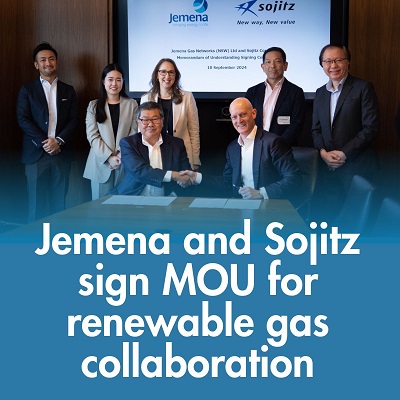More homes and businesses across New South Wales could soon incorporate renewable gas for heating, hot water, and industrial processes, thanks to a new Memorandum of Understanding (MOU) between Jemena, a leading energy infrastructure group, and the Japanese trading and investment company Sojitz.
This MOU will see Jemena and Sojitz collaborating to evaluate the feasibility of establishing several biomethane plants in regional New South Wales. These facilities will convert agricultural and organic waste into biomethane, a renewable gas created by processing biogas from decomposing organic materials.
Jemena’s partnership with Sojitz, which has an investment portfolio of AU$7.7 billion and employs over 23,000 people globally, builds on previous agreements with Optimal Renewable Gas and Valorify to explore the biomethane sector in New South Wales.
According to the Press Release, David Gillespie, Managing Director of Jemena, stated that the biomethane produced will be directed to the domestic market, offering businesses in New South Wales a viable way to decarbonise their operations.
“Today’s announcement marks a significant advancement in the development of Australia’s biomethane sector,” Gillespie remarked. “We believe there is potential to generate enough biomethane in New South Wales to satisfy the needs of all residential customers or around half of our industrial clients.”
Gillespie emphasized that many industries, particularly those requiring high heat, depend on gas for their processes. Sectors producing everyday items such as windows, bricks, fertilizers, and medicines cannot easily transition to electric power. The agreements announced today will enable these businesses to decarbonise while continuing to support local communities and the Australian economy.
Shigeya Kusano, President and CEO of Sojitz for Asia and Oceania, noted that the company aims to explore biomethane projects with significant scale.
“With our extensive experience in the energy sector, we are focused on initiatives that align with the ongoing energy transition,” Kusano said.
Globally, Sojitz is enhancing its investments in innovative decarbonisation projects, such as collaborating with Sembcorp and Kyushu Electric to supply green ammonia from India to Japan, along with investments in renewable projects worldwide. In Australia, Sojitz is involved in the Edenvale Solar Park in Queensland and has acquired Ellis Air Group Pty Ltd., a company specializing in energy-efficient air conditioning design and construction in Victoria.
Sojitz plans to identify efficient biomethane production sites utilizing existing agricultural waste from grass, hay, and animal feed, as well as other organic domestic waste.
According to the Australian Renewable Energy Agency’s 2021 Bioenergy Roadmap, Australia’s bioenergy sector could contribute approximately $10 billion annually to GDP, create over 26,000 new jobs, and reduce national emissions by about 9% by the start of the next decade.
Biomethane shares the same chemical properties as natural gas, making it compatible with existing gas infrastructure and appliances used in homes and businesses.
Although biomethane production is still emerging in Australia, it is demonstrating the advantages of a circular economy on a global scale. Denmark aims for 100% biomethane injection by 2030, while Ireland plans for all gas transported through its network to be renewable by 2045.
Gillespie emphasized the importance of collaboration between industry and government to advance the biomethane sector.
“We have seen positive developments, with the New South Wales Government consulting on a renewable gas sector and the Federal Government considering how its use should factor into businesses’ emissions reporting. We are eager to see this policy momentum grow as we establish a biomethane sector.”
Follow us on LinkedIn for more such news





